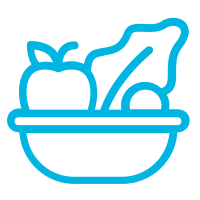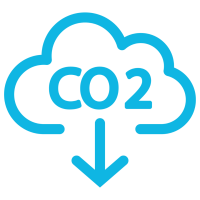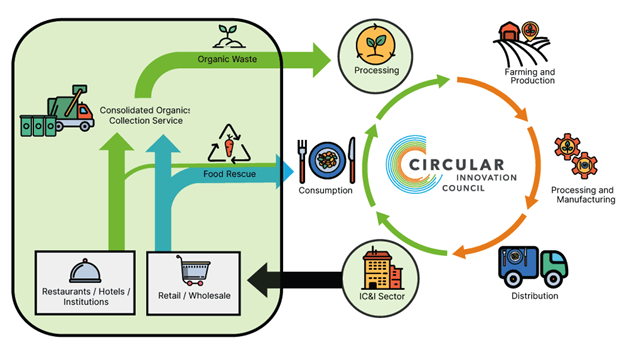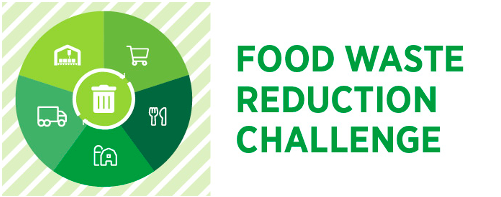




*Counters include all food waste programs. Last Updated: December 2025.
Circular Innovation Council simplifies food rescue and reduces the cost of organic waste diversion through innovative, cooperative pilot programs tailored for the institutional, commercial, and industrial (IC&I) sector—making impacts where it’s needed the most.
Participants, including businesses and institutions of any size and type, will benefit by:
The pilot educates and supports all types of businesses and institutions on keeping edible food and valuable compost out of waste bins, working with food rescue partners and their technology to simplify edible food donations to local community agencies, and make composting affordable.
To reduce the cost of food waste diversion, the program mimics the collection efficiencies of the municipal door-to-door waste collection model by designing regionally consolidated food waste collection services among neighbouring businesses. Participants can include any facility or business that generates food and food waste; grocery stores, restaurants, hotels, hospitals, schools, and more.
Historically, business or institutional locations had to find their own organics collection service provider and pay premiums for the individual services. In other cases they didn’t generate enough organics to find a service provider. This uncoordinated individual approach causes collection inefficiencies and increased costs. Simultaneously, with limited regulatory requirements and higher costs for diverting food waste over garbage disposal, many IC&I establishments are throwing valuable and sometimes edible food waste in the garbage. Part of the problem is the lack of accurate data to help businesses manage and divert food waste. This pilot solves these problems.

Circular Innovation Council is pleased to share the public release of our new research report prepared for Environment and Climate Change Canada: Investigating Barriers, Drivers, and Opportunities that Influence Diversion of Organic Waste in Canada’s ICI Sector.
The report explores Canada’s policy landscape relating to IC&I organics diversion and highlights key findings from municipalities and IC&I stakeholders across Canada, identifying key systemic barriers that limit organics diversion, drivers that enable action, and opportunities for policy, infrastructure, and collaborative solutions to advance ICI organics diversion in Canada. This research builds on learnings from CIC’s IC&I food waste diversion pilot programs and contributes to the national dialogue on reducing methane emissions, resource recovery, cross-sector collaboration, and practical advancement of Canada’s circular economy.
Over 50% of all food in Canada is wasted every year, while one in six Canadians suffer from food insecurity.
It is estimated that individuals and households in Canada waste more than $10 billion worth of food annually. When taking into consideration manufacturing and processing, that figure rises to $21 billion. Expanding the value chain to include distribution, institutions and businesses, (e.g., transport, restaurants, retailers) estimates the total value of wasted food at more than $49 billion annually across Canada [1].
While the economic costs of food waste are staggering, we must also consider the high environmental and social costs. Organics are the single largest waste stream found in landfills. When organic material is sent to landfill to decompose, it releases methane, a GHG at least 25 times more potent than carbon dioxide. Furthermore, avoidable food waste also wastes the energy, water, labour, and other resources that go into food production. With food insecurity being driven higher due to high inflation, and food insecure households more likely to experience significantly greater health problems, the value of rescuing edible food to community agencies continues to climb.
Businesses, institutions and all levels of governments are urgently working to decarbonize Canada’s economy. Supporters and participants in the pilot are an integral part of the solution by diverting valuable resources–edible food and organic compost–to communities and processing.
The food rescue and organic waste diversion pilots address the shortage of publicly available data detailing typical weights and volumes of leftover food and food waste produced by nine IC&I subsectors and small sized businesses (grocery retailers, hospitals, hotels, office buildings, manufacturers, multi-residential buildings, restaurants, schools, and shopping complexes). The pilots are trialling cart-based sensor technology to capture and share average weights of organic waste in each subsector.
Through food rescue data-driven partnerships, the average weight of leftover (edible) food rescued by community agencies is also recorded to share average weights of edible food rescue in each subsector.
Pending determinations of consistency of food waste densities in the various subsectors, the pilot is exploring the opportunity to develop a weight-based business model that incentivizes businesses and institutions to prevent food waste and thereby reduce their costs.
We are testing a co-operative financial model where costs are shared by all users through a buying consortium. By maximizing participation cost and service will be optimized.
Maggie Bain
Project Manager
maggie@circularinnovation.ca
Sharing Platform: Fully utilizes assets by maximizing usage and value amongst many users.
Resource Recovery: Acquires additional use and value from existing resources by avoiding disposal and impacts from new resource extraction.
Circular Innovation Council is a proud finalist of the Food Waste Reduction Challenge’s Business Model Streams, funded through Agriculture and Agri-Food Canada.

Out of 255 submissions from 131 cities, the pilot in collaboration with Our Food Future Guelph-Wellington was awarded Special Mention at the Milan Urban Food Pact Global Forum. Read more
Thank you to the Sustainable Waterloo Region for our “Sustainability Breakthrough” award at the Evening of Recognition. We’re honoured to receive this award for our Commercial Food Waste Diversion pilots!
CITATIONS
[1] Nikkel, L., Maguire, M., Gooch, M., Bucknell, D., LaPlain, D., Dent, B., Whitehead, P., Felfel, A. (2019). The Avoidable Crisis of Food Waste: Roadmap; Second Harvest and Value Chain Management International; Ontario, Canada. Accessible from: www.SecondHarvest.ca/Research
We respectfully acknowledge that we live, work and play on the traditional territory of many Indigenous Nations and we humbly extend our respect to Indigenous individuals, communities and Elders, past and present, as the traditional custodians of this land.
Circular Innovation Council is a registered charity.
Charity Registration Number: 119112118 RR 0001